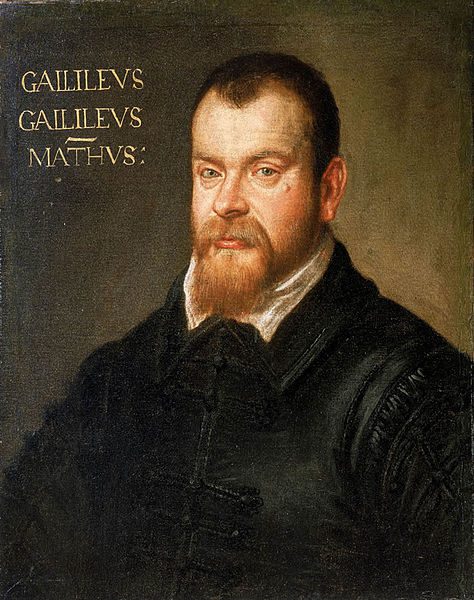Reply to atheist Neil Carter’s article,“Why Do Intelligent, Well-Educated People Still Believe Nonsense?” (10-9-15)
Galileo Galilei (1564-1642); portrait (c. 1605-1607) by Domenico Tintoretto (1560-1635) [public domain / Wikimedia Commons]
Neil Carter’s cited words will be in blue.
* * * * *
Last night for the third time in as many months I found myself explaining to someone raised outside of a devoutly religious environment that religious people are not stupid simply because they believe nonsensical things. . . .
Very often they flatly disagree and insist that anyone who believes in things like demons and angels and Young Earth Creationism must be morons. But then like last night they get a puzzled expression as they sit across from me and finally admit, “The thing is, you don’t seem stupid to me. So how on earth did you ever believe such things?”
Good article. I can heavily relate to it. I, too, have often found myself explaining to someone not familiar with the devoted atheist environment, that atheists are not stupid or wicked simply because they believe nonsensical and absurd things.
It’s tough for us non-believers in the atheist “vision” and worldview to comprehend how intelligent, sharp people with lots of degrees and books read and high IQs and a profound love of science, manage to believe that trillions of atoms (having popped into existence for no known or discernible reason in a Big Bang: an event now accepted and first developed by a Catholic priest, Georges Lemaître) — but we “know” that GOD COULDN’T HAVE DONE IT!!! — and their distant relatives, cells, can make absolutely everything in the universe occur, by their own power, possessed eternally either in full or (who knows how?) in inevitably unfolding potentiality. We’re baffled at how they can attribute to atoms and cells the omnipotence and omniscience and extraordinary creative power that we attribute to an eternal spirit, God. But they manage to do so.
We’re baffled how intelligent scientists could be fooled by Piltdown Man for 41 years (!). Henry Fairfield Osborn, President of the American Museum of Natural History, thought the jaw and skull belonged together “without question”. It turned out to be an obvious hoax: the jawbone of an orangutan attached to a human skull. Atheist paleontologist (and great critical writer on the history of science) Stephen Jay Gould observed that it was immediately apparent that it had been tampered with — if only someone had bothered to look closely at the damned thing during all those years. Finally someone did. It just took 41 years . . .
But it had been accepted for 41 years as a compelling proof of Darwinian human evolution, and thrown in the face of the folks at the famous Scopes trial in 1925 (I happened to visit that courtroom this summer). Nebraska Man: another silly so-called “specimen” — was widely accepted from 1922 to 1927, and turned out to be a tooth of an extinct pig (one tooth was the entire evidence for it). It’s another case of intelligent scientists believing in folly.
It’s remarkable how often throughout history this happens. Of course we don’t hear much about it, but these follies and imbecilities assuredly happened, just as all the stuff we constantly hear about Christian history happened (albeit usually fantastically distorted and exaggerated, as I have myself shown in my apologetics work, time and again).
Scientists started becoming enthralled with eugenics in the early 20th century, and advocated things like sterilizing black men, so they wouldn’t pollute white society too much. We saw how Germany, a highly advanced, pro-scientific society, started using its scientists to torture Jewish prisoners in concentration camps for “scientific experiments.” It’s tough to grasp that one! How could the “smart” people do such things? The Nazis loved eugenics. That was sufficient to wake up the scientists who loved it, and it fell by the wayside. Nuthin’ like a wake-up call, huh? The Wikipedia article on eugenics states:
[T]he modern history of eugenics began in the early 20th century when a popular eugenics movement emerged in Britain and spread to many countries, including the United States and most European countries. In this period, eugenic ideas were espoused across the political spectrum. Consequently, many countries adopted eugenic policies meant to improve the genetic stock of their countries. Such programs often included both “positive” measures, such as encouraging individuals deemed particularly “fit” to reproduce, and “negative” measures such as marriage prohibitions and forced sterilization of people deemed unfit for reproduction. People deemed unfit to reproduce often included people with mental or physical disabilities, people who scored in the low ranges of different IQ tests, criminals and deviants, and members of disfavored minority groups.
The “enlightened” French revolutionaries who worshiped the “goddess of reason” in the late 18th century were so smart that they decided that the father of chemistry, Antoine Lavoisier, ought to be put to death. But those wicked evil Catholics, who burned everyone at the stake, right? [wrong!] were so brutal to Galileo 150 years earlier that they sentenced him to (are you ready?!) house arrest in the luxurious palace of a supporter (Niccolini, the ambassador to the Vatican from Tuscany). Somehow we all hear about the [grossly distorted and twisted] story of Galileo. And that is, of course, because he took on the big bad evil Catholic Church (never mind that Copernicus was a good Catholic, and that his revolutionary book had been endorsed by the pope of the time).
But Copernicus (1473-1543) had erred in asserting circular orbits and in holding that the sun was the stationary center of the universe, with not only the earth and the other planets of the solar system, but also all the other stars, moving around it. He also believed that transparent rotating crystalline spheres carried the planets in their orbits. So why is only the Catholic Church mocked for the temporary scientific errors of some of her members during this fledgling period of astronomy, when everyone else held to errors, too?
Not so well-known are the stupid errors that Galileo (1564-1642) believed in. He rejected Johannes Kepler’s (1571-1630) elliptical orbits of the planets, considering the circle the “perfect” shape for planetary orbits; even though his main publications (unlike Copernicus) came after Kepler’s groundbreaking work. Galileo was oblivious to the current, cutting-edge, correct science of orbiting planets.
Einstein described Galileo’s failure to incorporate Kepler’s laws as “a grotesque illustration of the fact that creative individuals are often not receptive”. Kepler was correct in asserting elliptical orbits of the planets around the sun, at varying speeds (both notions having been foreseen by the Catholic Cardinal Nicholas of Cusa in the 15th century), but continued to err in thinking that the sun was the center of the entire universe.
Galileo was wrong in following Copernicus’s (and Kepler’s) view that the sun was the stationary center of the universe, with the earth and other planets of the solar system, and also all the other stars, moving around it. In this respect, he and Copernicus had hardly advanced beyond what was already posited by the ancient Greek astronomer Aristarchus (d. c. 230 B. C.). All three had merely moved the center of the universe 93 million miles from the earth to the sun.
Galileo, moreover, argued vehemently in his 1623 book The Assayer that the comets of 1618 were merely an optical illusion. Furthermore, Galileo dismissed as a “useless fiction” the idea, held by Kepler, that the moon caused the tides. He thought they were caused by the rotation of the earth. Galileo (like Kepler) was an avid proponent of astrology (see “Galileo’s Astrology,” by Nick Kollerstrom). He drew up astrological charts for his two illegitimate daughters, and composed character-judgments based upon them. For his oldest, Virginia, he noted:
The Moon is very debilitated and in a sign which obeys. She is dominated by family relationships. Saturn signifies submission and severe customs which gives her a sad demeanour, but Jupiter is very well with Mercury, and well-aspected corrects this.
St. Robert Bellarmine, who was directly involved in the Galileo controversy, made it clear that heliocentrism was not irreversibly condemned, and also that a not-yet proven theory was not an unassailable fact. Bellarmine actually had the superior understanding of the nature of a scientific hypothesis. The mere observations of the telescope had not technically proved anything. True heliocentrism wasn’t conclusively proven until some 200 years later. Thus, Bellarmine’s attitude was more advanced regarding scientific method than the dogmatic Galileo’s attitude was. I’d bet that not one in 25,000 (maybe 100,000) people know that!
Tycho Brahe (1546–1601) erred insofar as he was a geocentrist and held (Tychonic “geoheliocentric” system) that the sun and moon revolve around the earth, and the other five planets revolve around the sun: in circular, not elliptical orbits. Also, in his system the earth did not rotate. He was an avid proponent of astrology, too, and even Isaac Newton was fascinated with alchemy, a sort of half-sister to astrology, and long considered a pseudo-science.
No one was infallible in this period, according to modern-day science. Those who condemn only the Catholic Church because some of its prominent members held to geocentrism a bit longer, are simply ignorant of history, or are choosing to selectively present it, so that the Catholics look stupid and the scientists unfailingly brilliant, intelligent, and forward-looking. Isn’t the real, full truth far more fascinating?
It’s hard to understand how intelligent, informed scientists could be enthralled with a pseudo-science as stupid as phrenology (“observing and/or feeling the skull to determine an individual’s psychological attributes”) for many decades (mostly from around the 1770s to the 1840s, but in some scientific circles, well into the 20th century).
We shouldn’t regard these thousands of “enlightened” scientists (not infrequently, also agnostics or atheists) as stupid; just those who somehow come to believe in nonsensical, absurd, utterly implausible things. Y’all don’t “get” us; we don’t get y’all. But we gotta be kind and nice to each other anyway.
Carter goes after Dr. Ben Carson in his article:
To see what I mean by compartmental intelligence, look no further than presidential candidate Ben Carson, who distinguished himself as a pioneering brain surgeon but who displays the political acumen of a remedial third grader. As a presidential candidate I must say he makes a fine neurosurgeon.
But take solace, my atheist friends; as a Seventh-Day Adventist, Dr. Carson (from my hometown of Detroit) rejects the doctrine of hell (they believe in annihilationism). So will atheists and theological liberals (among whom a denial of hell is quite the trendy fashion these days) praise him to the skies for that? I won’t hold my breath.
If Dr. Carson has no political abilities (here, Carter merely reveals his political bias, not atheism per se), I’d love to see how President Obama is ranked in Carter’s estimation (catatonic? unconscious? ignoramus?). One of my daughter’s guinea pigs could have done a better job than he has these past seven years.
Iran can be trusted regarding nuclear weapons or anything else? The radical jihadists have no relation to even a perverted version of Islam? We’ll get to keep our doctors and health insurance won’t increase in cost? We’ll live in a wonderfully colorblind, racist-free liberal Utopia, with lower crime, etc.? African-American incomes will go up? We’ll control illegal immigration? The south side of Chicago will cease being a murderous hellhole? Socialism will get the US economy going? Right.
How utterly stupid and anti-scientific also is it for intelligent “enlightened” people, to argue that babies in the womb are not human beings? Do pro-abortion atheists wanna argue about the genetic science involved in that? no; they almost never do that. Talk about absolutely ignoring science and all common sense . . .
I’d much rather have a President Carson than a President Obama, who believes the ghastly, ghoulish murder of the most helpless and innocent human beings; believes in sucking the brains out of a full-term baby, or winks at the practice of delivering perfectly intact, healthy babies, only to dissect and dismember them outside of the womb, in order to harvest their body parts for profit (and if evil is also stupid, these outrages are extremely stupid). Dr. Carson has devoted his life to saving lives, not deliberately ending them, or indulging in the most hideous, cruel tortures for a profit motive.
Carter continues:
Another thing you must realize is that very intelligent people will believe very nonsensical things if you get to them young enough. When you grow up in an environment which takes for granted that a system of belief is sacred, your knowledge base and your critical thinking skills grow up around that belief structure in such a way as to leave it undisturbed.
I agree, totally. Atheists who grow up in the atheist environment, or surround themselves with only like-minded people (after work) will continue on as good atheists, oblivious to all the absurdities inherent in the position. They take it in with their mother’s milk. That argument cuts both ways . . . Carter grew up some kind of Christian (lemme guess: a fundamentalist?) and later rejected it for atheism. So he doesn’t fit into this mold. I don’t either. I grew up as a very theologically ignorant nominal Methodist till age 10, when we stopped going to church, at which time became a “practical atheist” enthralled with the occult. I converted to evangelical Protestantism at age 18 and again to Catholicism at age 32, as a result of my own study, not environmental factors (I was surrounded by almost all Protestants in 1990!).
I agree that many people fit this mold, but not just Christians. Anyone of any stripe is highly prone, statistically, to “become what they eat.” It’s by no means only a Christian phenomenon. He continues:
We learned at an early age that human reasoning cannot be trusted. . . . With a narrative like that, is it any wonder that Christians grow up suspicious of the life of the mind? We were taught to distrust our own intellects even within those subcultures which otherwise valued science, education, and exploration . . .
Now here he clearly betrays the fact that he must have grown up in anti-intellectual fundamentalist circles. This is very common among former Christians who become atheists. But the mistake he makes is to equate that small sub-community with all of Christianity. He doesn’t qualify it. I don’t recognize this mentality in the many Protestant and Catholic subcultures I have been involved in (Methodist, Lutheran, messianic Jewish, non-denominational “Jesus Freak”, Assemblies of God, Inter-Varsity, Baptist, the cult researcher community, the pro-life community, Catholicism since 1990). I never saw it.
What’s fallacious here is for Carter to assume (or so it would seem) that Christianity as a whole teaches a hostility to reason and science. It’s simply not the case. I was never a fundamentalist; never a young-earther, never denied the possibility of evolution, never feared (in abject horror) that science would “disprove” my faith, didn’t go to bed every night scared to death that quantum mechanics or black holes would prove that God doesn’t exist (we were correctly taught that faith and reason and faith and science were harmonious; not at odds).
And I was an evangelical from age 18 to 32. If one knows the history of the fundamentalist-modernist conflicts of the 1890s and 1920s and the emergence of evangelicalism after World War II, they would know that evangelicalism welcomed reason, culture, and science, in reaction to fundamentalism, that had gone too far in reaction to theological liberalism.
Carter describes his former belief-system as “evangelical,” but it sure sounds like “fundamentalist” to me, with its strong distrust of reason. Luther and Calvin started out with a strong distrust of reason, philosophy, and science, too, but their followers have not followed that, for the most part. The Catholic Church has always valued reason and science and philosophy. I wrote a book detailing the profound, overwhelming Catholic and Protestant and theist influence in the history of science.

















